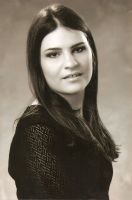William Wordsworth (1770-1850) and George Gordon Byron, Lord Byron (1788-1824)
Wordsworth was born and spent his youth in the Lake District, the wildest and most mountainous part of England. He studied at Cambridge University, and during one of the vacations he went to France, where he became inspired by the ideals of the French Revolution. Disillusioned by the later excesses of the revolutionaries and by his personal experiences in France he passed through a period of profound despair, but was restored to happiness by his sister, for whom he always felt the deepest affection, and by his friend Coleridge, then his neighbor in Somerset. In 1800 Wordsworth returned to spend the rest of his life among his native mountains. He obtained a government post which ensured him an income without occupying much of his time, and in 1843 he became Poet Laureate.
Wordsworth wrote a large quantity of poetry, but his work is very unequal in quality. At his best, he is one of the greatest of English poets, and has had a great influence on English literature and thought.
Byron belonged to an aristocratic but extravagant and undisciplined family. He was proud and impatient, and when his fellow-students at Cambridge seemed to despise him for being lame and unable to excel at sport, he wrote his book of poems, Hours of Idleness, to prove that he could excel at something.
In 1812 he had a great success with his narrative poem Childe Harold, but his marriage and other personal relationships were so unfortunate that in 1816 he left England for good and settled in Italy, where he lived till 1823. In the following year he died in Greece, where he was helping the Greeks to free themselves from the power of the Turks. In this he was a truer Romantic than in his poetry, which is often rhetorical. Byron`s most important work was a long, satirical poem, Don Juan.
